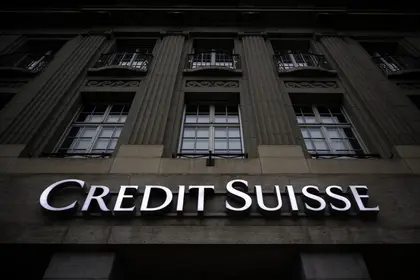The long history of one of Switzerland's largest banks has come to an end. What could be more reliable than a Swiss bank, you ask? Fair question.
This past weekend, Swiss banking regulators weren’t taking it easy - everyone was trying to save Credit Suisse, a bank with one foot in the grave. And as a result, the pride of Swiss banking was saved, but the bank itself was absorbed by another bank - the Union Bank of Switzerland (UBS).
JOIN US ON TELEGRAM
Follow our coverage of the war on the @Kyivpost_official.
So, what happened? What did the Swiss do? What caused the crisis?
The funny part is that they haven't really done anything - or almost anything. Investors have been keeping their eye on the bank for a long time, as things have not been going too well in recent years.
And with a potential banking crisis, it was the first candidate to strike out. The bank has been unprofitable for the past few years, and there have always been some scandals around it, undermining trust in the financial institution. And questions were constantly raised about the bank’s business model.
However, the bank had no problems with capital and liquidity - that is, it had no problems up until 10 days before its story came to an end.
Up until a certain large bank in California was not particularly attentive to the risks, and the markets saw the first effect of rising interest rates on the economy.
Everyone has lived too long in the endless free-money situation and built their business models accordingly. First came inflation, but in California, they didn't really stress out.
And then the central banks started raising the accounting rates - at first, in the US. This was the moment to start stressing out. Especially when your bank’s business model is built on simple operations without compliance with the simplest risk management. When you take short-term deposits and use them to buy long-term treasury bonds. Then one day it suddenly stops working.
As a result, the Bank of Silicon Valley kicked the bucket in less than one week. Regulators did their job and saved everyone, so as not to repeat 2008, not fill the market with doubt, and not let anyone see another “Lehman Brothers moment.”
All of this may have been happening the States, but investors here still got scared and started to look for a potential weak spot in the European banking system. Which, to be honest, has not been setting the Thames on fire for the last couple of years.
And Credit Suisse was the first bank to be targeted by investors. The sale of Eurobonds of this bank had begun - at one point, their value almost equaled the value of Eurobonds of Ukrainian state banks.
And at that moment, the second event that determined its future transpired. A representative of one of the shareholders from Saudi Arabia made a careless statement that the shareholder was not planning to support the bank. He did not say anything special, especially since the bank didn't even need additional capital at that time.
However, one careless phrase was indeed said, and despite the assurances of analysts that “he didn't mean it,” it added insult to injury and only aggravated the situation around the bank.
It seemed they would be able to stop the crisis, and when the Swiss regulator granted the bank a loan of 50 billion Swiss francs to reassure the market of its good liquidity position, everyone should have breathed a sigh of relief.
But it didn't work. People continued to withdraw their deposits, leaving no choice for the Swiss Central Bank but to organize an emergency takeover.
And on Monday morning, Credit Suisse was history.
What is the moral of this story?
First, the regulators learned the lesson of 2008, and they do not want to repeat their own mistake when they decided they could let Lehman Brothers fail.
Secondly, no bank would have survived such an attack - even UBS would not have been able to cope with such an outflow of deposits. But the clients came to Credit Suisse, and it shows us that reputation is worth something - in fact reputation is very expensive - even for Swiss banks.
And we also saw the early signs of the effect of raising rates. Surely, there is more to come. Whether they will lead to a crisis is unknown, but there are definitely risks.
The years of comfortable conditions, when businesses bathed in money, could not help but leave a mark on their balance sheets and skeletons in their closets. And now the time of reckoning has come.
You can also highlight the text and press Ctrl + Enter



